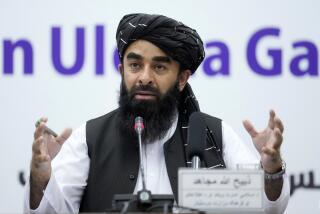Afghan president signs deal on pipeline project
- Share via
KABUL, AFGHANISTAN — Afghan President Hamid Karzai met with regional leaders Saturday to sign an agreement for a massive energy project that could eventually net his country billions of dollars in revenue: a 1,000-mile natural gas pipeline whose proposed route cuts through the heartland of the Taliban insurgency.
As if to highlight the complications facing the project, at least 26 people were killed in attacks Friday and Saturday, including a Taliban commander and several people believed to be with a private security firm, Afghan and NATO officials said.
The United States strongly supports the proposed pipeline because it could draw Central Asia’s significant energy resources to Pakistan and India and bypass Iran, Washington’s top adversary in the region.
Karzai met with Turkmen, Indian and Pakistani officials in Ashgabat, the capital of neighboring Turkmenistan, to sign the accord.
“On this very important occasion, let me once again highlight our vision for regional cooperation, which is to contribute to regional stability and prosperity,” Karzai said in a statement, “and to enhance the conditions for Afghanistan to resume its central role as a land bridge in this region.”
But the proposed $7.6-billion TAPI Gas Pipeline project and any revenue it may generate may be years away. The planned route passes from Turkmenistan, a former Soviet republic, through violent territory still unsettled by insurgencies, including the southern Afghan city of Kandahar, the birthplace of the Taliban, and the Pakistani city of Quetta, which is considered the home of the Taliban leadership.
The latest violence took place in Afghanistan’s south and the northern province of Kunduz.
In the most deadly attack, a roadside bomb blast struck a pickup truck carrying Afghan men Friday in a rural stretch of Helmand province, killing 15 people, Daoud Ahmadi, a spokesman for Helmand’s governor, said Saturday.
Also in Helmand, a man described as a senior Taliban commander and three members of his family were killed Saturday in a North Atlantic Treaty Organization airstrike, the official Bakhtar news agency reported.
A car bomb exploded Saturday afternoon in the parking lot of the Information and Culture Directorate in Kandahar, injuring four police officers and two youths, said Zalmay Ayoubi, spokesman for the governor there.
“The enemies of peace and the people have lost the ability to fight against the government, and now they want to terrorize the public by committing such criminal acts just to show their existence,” said a statement issued by the governor’s office.
In Kunduz, a suicide bomber driving an explosives-laden car attacked an Afghan army checkpoint, injuring five soldiers and nine civilians in nearby homes, mostly women and children, said Muhbullah Sayedi, a spokesman for the provincial governor.
U.S.-led forces also announced an investigation of allegations that seven Afghan members of a private security firm were killed Saturday during a counterinsurgency operation near the eastern Afghan city of Gardez, the site of a Dec. 5 suicide bombing that killed Western troops.
A military news release said the U.S.-led troops opened fire after armed men emerged from a vehicle and compound suspected of being linked to the Haqqani network, which is allied with the Taliban.
“The security force takes civilian casualty allegations seriously and is currently accessing who the individuals were, why they were armed and why they were in that area at that time of the morning,” the news release said.
Protecting civilian lives has become a key component of the international force’s strategy in Afghanistan. Deteriorating security erodes the Afghan civilians’ trust in the central government and its armed forces, sometimes leading them to turn to the Taliban for protection.
The United States hopes the Afghan army and police force will be able to secure the country and tamp down the Taliban once international troops begin to depart. But attempts at political reconciliation between the central government and the Taliban, which ruled Afghanistan from the mid-1990s until the U.S. invasion in 2001, appear to have stalled.
Defense Secretary Robert M. Gates told reporters Wednesday in Kabul, the Afghan capital, that a large U.S. troop buildup in Afghanistan was showing results.
After a meeting with Karzai, Gates told reporters he would return to Washington believing that Afghanistan will be ready for a planned U.S. troop drawdown by 2014, as set out by President Obama.
--
Special correspondents Aimal Yaqubi and Hashmat Baktash in Kabul contributed to this report.
More to Read
Sign up for Essential California
The most important California stories and recommendations in your inbox every morning.
You may occasionally receive promotional content from the Los Angeles Times.










